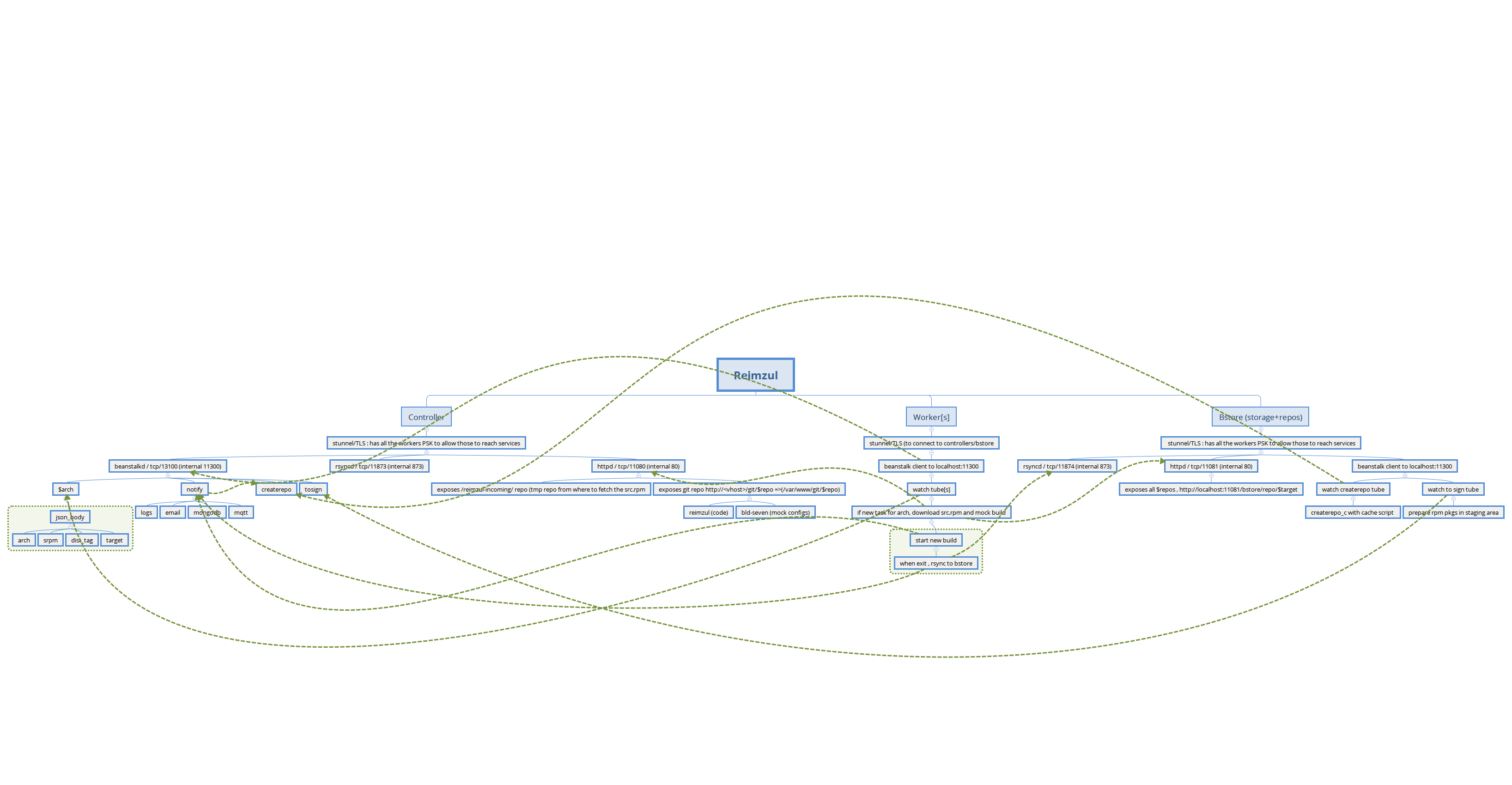Reimzul CentOS 7 distro build system
Reimzul CentOS 7 distro build system¶
Note
Reimzul is a distributed build system that is used to build CentOS Linux up to (and including CentOS 7). For CentOs 8/8-stream/9-stream and beyond, see other koji system
Reimzul overview¶

Reimzul consists only of some python scripts, that are used as wrappers around mock.
The following components are used to orchestrate the builds and notifications:
- beanstalkd : used as build queues, per arches
- stunnel : all components are using TLS connections , so including workers connecting to beanstalkd, to "watch" the queues and pick the build jobs landing in those queues, as well as for http (to retrieve the src.rpm to build) and then also for rsync (transferring artifacts - logs,rpm - to bstore node)
- MQTT : python-paho-mqtt : sending results to a mqtt broker, with other subscribers used for notifications (including IRC)
- MongoDB : just use as document store to load build results and so be able to track/query build history
Controller¶
This is the node that runs beanstalkd for the various tubes/queues To submit a pkg, we have two options:
- build a .src.rpm, uploaded under /srv/reimzul/incoming and call (local) reimzul_submit.py script (see above)
- remotely trigger a build from git (including branch/tag/commit id) through reimzul_client (see above)
Example when willing to submit same src.rpm (already uploaded !) to multiple arches :
for arch in x86_64 aarch64 armhfp ; do /srv/reimzul/code/reimzul_submit.py -s time-1.7-45.el7.src.rpm -d .el7 -a $arch -t c7.1708.u ; done
Important to know that there is no need to submit for i386 : it will be done automatically in parallel on the builder doing the x86_64 build, with the same timestamp
The controller has also a dispatcher worker (msg_dispatcher.py) that watches the notify tube, and will :
- send mails to specific rcpts for each failed/successful build
- log to /var/log/reimzul/reimzul.log
- add each job to local mongodb instance
- also send json payload over mqtt (so then various subscribers can reuse those payloads, including for example for irc notifications)
To control those notifications, reimzul uses a config file /etc/reimzul/reimzul.ini (see reimzul.ini.sample for reference)
Processes :¶
- reimzul-notifier.py (sending notifications for build results, log, mqtt, mails)
- reimzul-mqtt-pub.py (process subscribed to some topic to allow remote builds, and that process will retrieve automatically from git and submit)
One reimzul notifier worker is enough to send notifications
cp systemd/reimzul-notifier.service /etc/systemd/system/
systemctl daemon-reload
systemctl enable reimzul-notifier --now
One reimzul mqtt subscriber worker is enough to wait for incoming build requests
cp systemd/reimzul-mqtt-sub.service /etc/systemd/system/
systemctl daemon-reload
systemctl enable reimzul-mqtt-sub --now
Builders (workers) :¶
These nodes are the ones that :
- watch for jobs in $arch (exception being x86_64, watching also i386 tube)
- download the src.rpm from controller (stunnel)
- submit it to mock
- upload results to bstore node (central http repo holding all the repositories)
- sending results back in notify tube
Processes :¶
- reimzul_worker.py
You can launch as many workers/builder threads you want : there is a .service systemd unit file (see systemd/reimzul-worker@.service) that you can then launch multiple times. For example, let's assume that we want 4 parallel workers :
cp systemd/reimzul-worker@.service /etc/systemd/system/
systemctl daemon-reload
for i in {1..4} ; do systemctl enable reimzul-worker@${i} --now; done
Bstore :¶
Central storage node that will accept all build artifacts under specific target repos. Worth noting that all communication, including rsyncd, happen over tls (through stunnel) It has also a worker itself, just watching the "createrepo" channel. When a build finishes and has a successful build, one job is added to the createrepo tube (you can have multiple parallel workers for this too) and repo metadata is launched through createrepo_c, with multiple workers per process and cache directory
Processes¶
- tosign_worker.py (will collect built pkgs in a staging area, waiting for pkgs to be then signed)
- repogen_worker.py (will regenerate repodata on each successful build)
You can launch as many repogen workers threads as you want : there is a .service systemd unit file (see systemd/reimzul-repoogen-worker@.service) that you can then launch multiple times. For example, let's assume that we want 3 parallel workers :
cp systemd/reimzul-repogen-worker@.service /etc/systemd/system/
systemctl daemon-reload
for i in {1..3} ; do systemctl enable reimzul-repogen-worker@${i} --now; done
One signer worker is enough (it will just copy the rpm files in a staging area, waiting to be collected for signing)
cp systemd/reimzul-signer.service /etc/systemd/system/
systemctl daemon-reload
systemctl enable reimzul-signer --now
Clients¶
Local client (on the controller, so need priv and local access)¶
Once a .src.rpm is built and available under /srv/reimzul/incoming, you can submit builds to Reimzul is to launch reimzul_submit.py :
usage: reimzul_submit.py [-h] -s SRPM -a ARCH -t TARGET -d DISTTAG [--now]
[--scratch]
Reimzul CentOS distributed build client
optional arguments:
-h, --help show this help message and exit
-s SRPM, --srpm SRPM The src.rpm pkg already uploaded in controller node
-a ARCH, --arch ARCH Defines the mock architecture to build against
[example: x86_64,armhfp,aarch64,i386,ppc64le,ppc64]
-t TARGET, --target TARGET
The target repo to build against/for, without any arch
specified [example: c7.1708.u]
-d DISTTAG, --disttag DISTTAG
Defines the mock disttag to use [example: .el7_4]
--now Will prioritize this job in front of the build queue
--scratch Will just build the pkg but not prepare it in staging-
tosign area